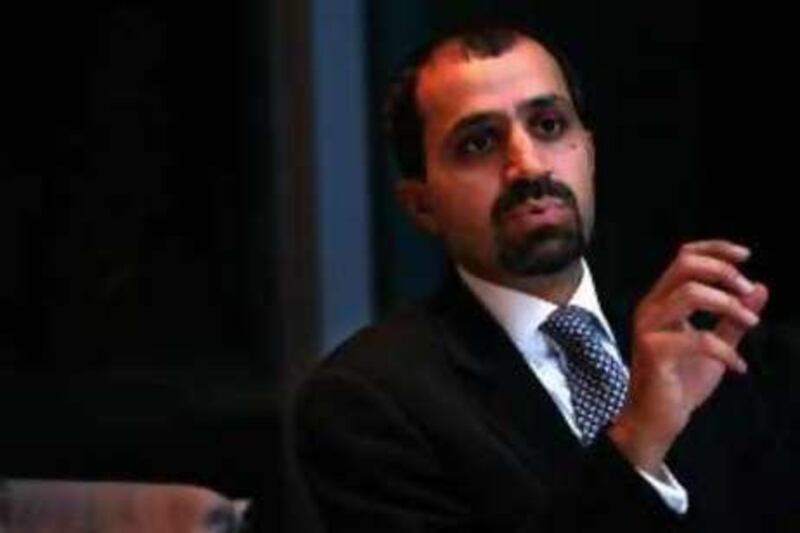Nasser Alshaali, the chief executive of the Dubai International Financial Centre, has risen quickly within the Dubai financial establishment. For two years now, he has been at the helm of the company that operates Dubai's financial industry free zone, a project crucial to the future of the emirate. In the preceding two years, he headed the emirate's newest securities exchange, the DIFX. With a global economic storm raging, one might expect Mr Alshaali - and Dubai itself - would be ready for a break. That is not what he has in mind, nor what he prescribes for a region now starting to feel the pain of the global credit crunch and economic slowdown.
His worry is that the Gulf could be missing opportunities. "This is not the time to be timid, this is the time to be bold," he says. "But in a calculated way." The region's financial systems need serious change to gain the sort of economic maturity and independence to which the Gulf aspires, he says. Under the right regional leadership, this time of turmoil could be the chance to push change through quickly.
"We need to have some sort of co-ordinated view and action plan for addressing these issues," he says. "Right now you don't have that. As much as people philosophise about the opportunity that they need to take advantage of, nobody's doing anything whatsoever about it. "I think it's shameful that the governors of the central banks of the GCC have not yet met to discuss the financial crisis." Mr Alshaali, 32, grew up in New York City and Washington, and moved to the UAE in 2001 only a few years after receiving a degree in philosophy and international relations from American University. Since then, he has played a central role in the financial services boom in the city. While chief operating officer at the DIFX - recently renamed Nasdaq Dubai - he helped launch the world's largest trading exchange for sukuk, or Islamic bonds. Now he is overseeing one of the few expanding financial centres in world. Dozens of firms have opened up in the DIFC, which provides a custom-built regulatory framework for international financial companies. Mr Alshaali says there remains a waiting list for office space.
He approaches the global economic downturn stoically. "With every aggressive growth period will come a correction," he says. "During the last five to 10 years, the region has experienced a tremendous wave of growth, encouraged by low interest rates that made money very cheap... Now we are paying for our sins." The downturn presents big challenges for the region, as well as Dubai's status as its leading financial centre. Just months after beefing up its regional operations, based in the DIFC, Lehman Brothers went bust. Morgan Stanley and Goldman Sachs, which set up in the DIFC a few years ago with great fanfare, recently cut their staffs by 15 per cent and 10 per cent, respectively.
On the other hand, the economic pain has focused new attention on the Gulf, with its wealthy families and well-funded governments. "The kind of interest and curiosity we have seen over the past two to three weeks has been absolutely tremendous, probably more than this region has received in the last few years," he says. "It seems the more the world gets itself into trouble, the more this region gets attention."
The upshot, he says, is that the DIFC will not grow as fast next year as it has since he was appointed the chief executive. "But that's a given. We will also not stop growing." In many ways, Mr Alshaali is far more concerned about the regional response to the crisis, since the GCC cannot have a world-class financial centre if it doesn't leverage its regional financial strengths as one to compete. And that means more co-operation and co-ordination among regulators, more competition and innovation among market players, a more robust infrastructure for making financial transactions and ultimately a consolidation of market might.
During times of economic crisis, countries can reflexively close themselves off from the rest of the world in an attempt to avoid "contagion". This is exactly the opposite of what needs to happen, he argues. "It is absolutely critical in that context that you keep your borders open, that you allow free competition into each other's markets. So foreign institutions, especially the banks, need to be allowed the opportunity to participate in the local markets in the UAE, and in the GCC, on par with their local peers."
Mr Alshaali thinks the focus should be on creating an environment that could enable the birth of "a regional banking success story, like HSBC out in the Far East". "You're going to need to build a regional liquidity pool in the capital market space that can rival the liquidity pools of New York, London and Hong Kong," he says. "Otherwise, you will be constantly subject to developments in those markets... You will be an appendage to those financial markets.
"The combination of Emirates and NBD is a step in the right direction," he says, referring to the banks' merger, but much more growth and consolidation within the region's banking sector and capital markets will be necessary if the Gulf is to gain true financial independence. Lately, there has been speculation that the DIFC's own stock exchange, Nasdaq Dubai (the recently rebranded Dubai International Financial Exchange) may be merged with the Dubai Financial Market (DFM) in part of that same consolidation. Trading volumes have remained relatively low on the Nasdaq Dubai exchange since its founding, especially compared to the DFM.
Although a merger is not out of the question, "at this point I don't think we have a clear picture," Mr Alshaali says. Whether the two do merge will depend on what happens in the market, and whether there is enough demand for two separate Dubai-based exchanges. Right now, it is still too early to tell, he says. tpantin@thenational.ae





